
One Earth
Scope & Guideline
Connecting scholars to address pressing environmental challenges.
Introduction
Aims and Scopes
- Interdisciplinary Approaches to Sustainability:
One Earth emphasizes the integration of various disciplines such as ecology, economics, sociology, and technology to tackle global sustainability challenges. This broad perspective enables a holistic understanding of environmental issues. - Climate Change Mitigation and Adaptation:
The journal publishes research on strategies for mitigating climate change impacts and adapting to its effects, including innovations in carbon capture, renewable energy, and sustainable agricultural practices. - Biodiversity and Ecosystem Services:
Research focusing on the preservation of biodiversity and the provision of ecosystem services is a core theme. This includes studies on the impact of human activities on natural habitats and strategies for effective conservation. - Socio-Ecological Systems:
One Earth explores the dynamics of socio-ecological systems, emphasizing the interdependencies between human societies and ecological health, and addressing issues of equity and social justice. - Sustainable Resource Management:
The journal advocates for sustainable management of natural resources, including water, land, and energy, highlighting innovative practices and policies that support sustainable development.
Trending and Emerging
- Climate Justice and Equity:
Recent publications are increasingly focusing on climate justice, exploring how environmental policies and climate change disproportionately affect marginalized communities. This theme emphasizes the need for equitable solutions in sustainability efforts. - Urban Resilience and Sustainability:
There is a growing emphasis on urban studies, particularly regarding how cities can adapt to climate change and enhance resilience through sustainable practices. This includes research on urban heat management, green infrastructure, and community engagement. - Technological Innovations for Sustainability:
The journal is highlighting advancements in technology that contribute to sustainability, such as carbon capture technologies, renewable energy innovations, and smart resource management approaches. - Nature-Based Solutions:
Research on nature-based solutions, which leverage natural processes to address environmental challenges, is on the rise. This includes studies on reforestation, sustainable agriculture, and ecosystem restoration as viable strategies for climate mitigation. - Behavioral and Social Change:
Emerging themes also include the exploration of behavioral and social factors influencing environmental sustainability, with a focus on how individual and community actions can drive systemic change.
Declining or Waning
- Traditional Conservation Approaches:
There has been a noticeable decline in publications focused solely on traditional conservation methods, such as protected area management, as the journal shifts towards more integrative and innovative approaches to conservation that incorporate socio-economic factors. - Single-Discipline Research:
Research that focuses narrowly on a single discipline, such as pure ecology or environmental science without interdisciplinary collaboration, is becoming less prominent. The trend is moving towards studies that integrate insights from multiple fields. - Static Policy Analysis:
Analyses that merely describe existing environmental policies without proposing innovative solutions or adaptations to changing conditions are appearing less frequently. The journal is favoring dynamic assessments that include actionable recommendations. - Fossil Fuel Dependency:
Research centered around fossil fuel dependence, particularly in the context of energy production, is waning as the focus shifts towards renewable energy solutions and sustainable alternatives. - Overly Technical Studies:
There is a reduced emphasis on highly technical studies that lack practical applications or relevance to broader societal challenges, as the journal prioritizes research with clear implications for policy and community engagement.
Similar Journals
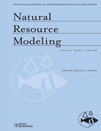
NATURAL RESOURCE MODELING
Bridging the gap between theory and practice in environmental modeling.NATURAL RESOURCE MODELING is a prestigious academic journal published by Wiley, focusing on the critical intersection of environmental science and modeling and simulation techniques. With an ISSN of 0890-8575 and an E-ISSN of 1939-7445, the journal has established itself as a vital resource for scholars and practitioners since its inception in 1990. Covering a wide array of topics related to the sustainable management and modeling of natural resources, the journal currently holds a reputable Q2 ranking in Environmental Science and a Q3 ranking in Modeling and Simulation, highlighting its impact within these fields, particularly with Scopus rankings placing it in the 60th and 57th percentiles, respectively. Although not an Open Access journal, it offers researchers, professionals, and students invaluable insights and methodologies pertinent to advancing the knowledge base in environmental management. The journal's commitment to high-quality research and its comprehensive scope reinforce its importance as a go-to publication for anyone interested in the sustainable future of our natural resources.

Agronomy for Sustainable Development
Transforming Agriculture Through Sustainable PracticesAgronomy for Sustainable Development, published by SPRINGER FRANCE, is a leading international journal dedicated to advancing the field of agronomy and sustainable practices. With its ISSN 1774-0746 and e-ISSN 1773-0155, this esteemed journal plays a pivotal role in disseminating cutting-edge research and innovative solutions that address critical challenges in agriculture and environmental engineering. Achieving remarkable rankings in Scopus—specifically, 19th out of 406 in Agronomy and Crop Science and 22nd out of 197 in Environmental Engineering—underscores its prestige, with a remarkable 95th and 89th percentile respectively. The journal is open access, promoting broader dissemination of knowledge, and welcomes contributions that foster sustainable agricultural practices and enhance environmental stewardship. As an essential resource for researchers, professionals, and students, Agronomy for Sustainable Development serves as a platform for interdisciplinary collaboration aimed at nurturing resilient agricultural systems and promoting sustainability worldwide.
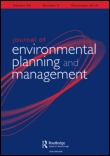
Journal of Environmental Planning and Management
Driving critical insights into sustainable practices and policies.The Journal of Environmental Planning and Management, published by Routledge Journals, Taylor & Francis Ltd, is a leading academic journal dedicated to advancing the field of environmental science through innovative research and critical analysis. With a robust impact factor and categorized in Q1 across multiple disciplines, including Environmental Science, Geography, and Fluid Flow, this journal holds a prestigious position in the academic community. It serves as a vital platform for researchers, professionals, and students interested in the complexities of environmental management, policy, and planning, promoting insightful discourse on sustainable practices and innovative solutions. Although the journal does not currently offer Open Access options, it remains widely accessible through institutional subscriptions, ensuring that pertinent research reaches a broad audience. Since its inception in 1992, the journal has shown a commitment to excellence, making significant contributions to our understanding of environmental issues and the interplay between human activity and natural systems. The Journal of Environmental Planning and Management invites submissions that not only push the boundaries of existing knowledge but also foster interdisciplinary collaboration in the quest for sustainable development.
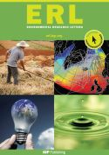
Environmental Research Letters
Driving discourse on global ecological challenges.Environmental Research Letters is a premier, peer-reviewed journal published by IOP Publishing Ltd based in the United Kingdom, dedicated to advancing the field of environmental science. With an impressive Impact Factor and consistently ranked in the Q1 category for its focus on Environmental Science, Public Health, and Renewable Energy, this open-access journal has been a vital resource for researchers and practitioners since its inception in 2006. Covering a wide scope of topics including sustainability, environmental health, and innovative energy solutions, ERL aims to promote discourse and disseminate groundbreaking research that addresses global environmental challenges. As a leader in the field, it holds prestigious positions in Scopus rankings, ensuring that published works reach a wide audience, thus driving impactful change. Researchers, professionals, and students alike will find valuable insights and essential knowledge within its pages, making it a keystone publication for anyone invested in environmental advancements.
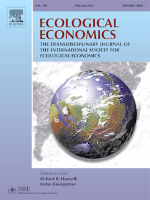
ECOLOGICAL ECONOMICS
Navigating the Complexities of Ecological and Economic Systems.ECOLOGICAL ECONOMICS, published by ELSEVIER, stands as a premier journal dedicated to the integration of ecological and economic thinking, exploring the complex interactions between human and natural systems. With an impactful history dating back to 1989, the journal has solidified its position in the academic community, evidenced by its classification in the top quartiles (Q1) of both Economics and Econometrics and Environmental Science categories for 2023. ECOLOGICAL ECONOMICS boasts impressive Scopus rankings, holding the 32nd position out of 716 in Economics and Econometrics and 19th among 233 in General Environmental Science, reflecting its substantial influence and reach. Although it does not currently offer open access options, the journal remains a vital resource for researchers, professionals, and students interested in sustainable development, environmental policy, and resource management. The ongoing convergence of various fields within ecological economics promises to yield valuable insights and foster interdisciplinary collaboration, making this journal an essential component of scholarly discourse.

All Earth
Elevating Scholarship in Earth and Planetary SciencesAll Earth is an esteemed open-access journal published by Taylor & Francis Ltd, dedicated to multidisciplinary research in the fields of Earth and Planetary Sciences, Global and Planetary Change, as well as Management, Monitoring, Policy, and Law. Since its inception in 2021, All Earth has swiftly positioned itself in the academic community, achieving notable rankings such as Q2 in Earth and Planetary Sciences and Q3 in related fields, showcasing its commitment to high-quality interdisciplinary scholarship. Researchers and professionals can benefit from its accessible content, which contributes to the ongoing discourse on critical environmental issues and innovative solutions for sustainable development. The journal is based in the United Kingdom and continues to be a vital source of information and inspiration for students and scholars aiming to tackle the pressing challenges of our planet through rigorous scientific inquiry and policy analysis.
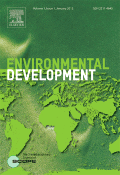
Environmental Development
Leading the charge in transformative environmental research.Environmental Development is a premier academic journal published by Elsevier, dedicated to advancing the field of environmental science through interdisciplinary research and innovative practices. With a focus on geography, planning, and development, as well as management, monitoring, policy, and law, this journal provides a rigorous platform for scholars and practitioners to share insights that shape sustainable environmental policy and practice. Holding a prestigious Q1 ranking in both relevant categories and boasting impressive Scopus rankings - 62 out of 821 in Geography and 60 out of 399 in Environmental Science - Environmental Development stands out as a critical resource for those invested in the future of our planet. The journal emphasizes impactful research that addresses contemporary challenges, fostering dialogue across disciplines and geographical boundaries. With a commitment to high-quality research, it offers an important outlet for those aiming to influence environmental policy and developmental strategies globally. Join the growing community of researchers, professionals, and students engaged in promoting sustainable environmental practices through the knowledge shared in this esteemed publication.

ENVIRONMENTAL MANAGEMENT
Advancing sustainability through rigorous research.ENVIRONMENTAL MANAGEMENT, published by Springer, stands at the forefront of advancing sustainability and ecological stewardship in the fields of Ecology, Global and Planetary Change, and Pollution. With an impressive tracking history from 1977 to 2024 and prestigious quartile rankings reflecting its significant impact (Q1 in Ecology and Q2 in both Global and Planetary Change and Pollution), this journal engages a wide range of stakeholders, including researchers, policymakers, and environmental professionals. The journal is a vital resource for those dedicated to addressing pressing global environmental challenges, publishing rigorous interdisciplinary research that informs policy and practice. While it does not offer open access, its content remains accessible through institutional subscriptions. Located in the heart of New York, ENVIRONMENTAL MANAGEMENT is dedicated to fostering a substantive dialogue on innovative approaches to environmental preservation and management.

GLOBAL JOURNAL OF ENVIRONMENTAL SCIENCE AND MANAGEMENT-GJESM
Leading the way in environmental discourse and innovation.Global Journal of Environmental Science and Management (GJESM), published under the distinguished leadership of Professor J. Nouri, is an esteemed academic platform dedicated to advancing the interdisciplinary discourse surrounding environmental science and management. With an ISSN of 2383-3572 and an E-ISSN of 2383-3866, GJESM has established itself as a prominent Open Access journal since 2014, allowing for unrestricted sharing of knowledge and research findings. Based in Iran, this journal caters to a diverse global audience, featuring contributions that span various critical domains including agricultural and biological sciences, environmental engineering, pollution management, and social sciences, evidenced by its impressive 2023 Q1 and Q2 quartile rankings across multiple categories. The journal’s Scopus rankings demonstrate a robust standing in the academic landscape, with exciting placements that underscore its relevance in key fields. By bridging the gap between scientific inquiry and practical application, GJESM serves as a vital resource for researchers, practitioners, and students seeking to understand and address the pressing environmental challenges faced by our planet today.
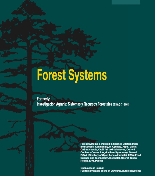
Forest Systems
Advancing ecological knowledge for sustainable forest futures.Forest Systems, an esteemed open-access journal published by CONSEJO SUPERIOR INVESTIGACIONES CIENTIFICAS-CSIC in Spain, has been a dedicated platform for advancing knowledge in the fields of ecology, forestry, and soil science since its inception in 1991. With an ISSN of 2171-5068 and E-ISSN 2171-9845, the journal is committed to disseminating high-quality research that addresses critical issues related to forest ecosystems and their management. Forest Systems is positioned within the Q4 category in Ecology, Evolution, Behavior and Systematics, and Q3 in both Forestry and Soil Science, evidencing its growing influence and relevance in these disciplines. Researchers will find a rich repository of articles that not only contribute significantly to academic discourse but also foster practical solutions to contemporary environmental challenges. As it converges from 2010 to 2024, the journal aims to enhance its outreach and impact, facilitating access for professionals, students, and policymakers committed to sustainable forest management and ecological conservation.